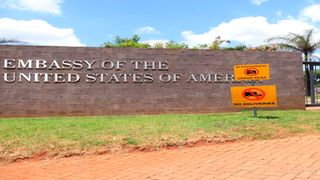
The entrance to the US Embassy in Nairobi in a picture taken on February 16, 2018.
| File | Nation Media GroupNews
Premium
Tax row: US Embassy’s Kenyan staff threaten to sue over new policy
What you need to know:
- Until recently, the locally sourced staff did not have pay-as-you-earn tax (PAYE) deducted from their payslips as remittance of taxes.
- Kenyans working with the embassy were asked to submit their Kenya Revenue Authority (KRA) PINs to a body some of them termed “a third party”.
A legal battle is brewing at the United States Embassy in Nairobi following a policy change that is likely to see Kenyan staff have mandatory taxes deducted directly from their salaries.
Until recently, the locally sourced staff did not have pay-as-you-earn tax (PAYE) deducted from their payslips as remittance of taxes was considered an individual’s responsibility.
“Each employee would work out a payment plan,” a source, who spoke on condition of anonymity for fear of reprisals, told the ‘Nation’.
Recently, Kenyans working with the embassy were asked to submit their Kenya Revenue Authority (KRA) PINs to a body some of them termed “a third party”. The staff interpret this as a way of making tax payment mandatory.
Some of the workers have contracted a law firm, Komm Advocates, which has written to the embassy headed by Ambassador Meg Whitman demanding that it rescinds the policy or face legal action.

United States Ambassador to Kenya Meg Whitman during a press briefing at the US Embassy in Nairobi.
“You recently published a post/agency policy changing the locally employed staff individual tax obligations and notifying them of your decision to pass that responsibility to [an] undisclosed third party,” the law firm wrote in a September 14 letter addressed to the embassy’s senior adviser and management officer. “Your mandatory instruction to the locally employed staff to submit their KRA PINs to an undisclosed third party violates the express provisions of the Data Protection Act applicable to Kenya.”
The embassy, in an email response to queries from the ‘Nation’, stated that it is only complying with Kenyan laws. It also denied any discriminatory decisions.
“The US embassy values all of its staff members and takes employee concerns seriously. As an employer in Kenya, the US embassy abides by all applicable local labour laws,” wrote an embassy spokesperson.
Insiders said that some categories of Kenyan employees serving other diplomatic missions do not have that mandatory deduction.
The letter, which was signed by Mr Fred Oundo, stated that if the embassy did not reply within five days explaining how it would handle the complaints, a lawsuit would follow.
The firm also said it would escalate the matter to the US Department of Labour, US Department of State, Kenya’s Foreign Affairs ministry, International Labour Organisation and the Central Organisation of Trade Unions.





